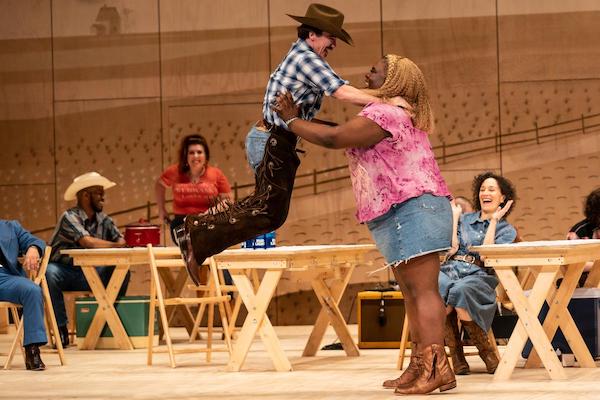
The “Oklahoma!” now sweeping across the country on a national tour is a dark, radically reimagined take on the show that debuted on Broadway in 1943. That sunny, clean-scrubbed version ran for over five years, was adapted for an Oscar-winning movie, and is today staged by American school and community theaters around the country in approximately 600 tradition-honoring productions annually.
Back when it premiered, there was little public backlash around the show’s romantic portrayal of farmers and ranchers squabbling and struggling as they found a new state in what had been known as Indian Territory (“The farmer and the cowman should be friends!”). Never mind the complete absence of Native American characters in the script. Never mind that “Green Grow the Lilacs”, the decidedly less cheerful play from which “Oklahoma!” was adapted, was written by Lynn Riggs, a writer of Cherokee descent (He also happened to be gay).
But the version now heading our way—developed at Bard College and St. Ann’s Warehouse in Brooklyn before winning a “Best Revival of a Musical” Tony on Broadway in 2019—finds director Daniel Fish effectively responding to the title song’s famous lyric “You’re doin’ fine/Oklahoma/Oklahoma, OK!” with an emphatic “I will refine/Oklahoma: Oklahoma P.C.!”
Changing perspectives
Cultural values have evolved since 1943 and, over time, “Oklahoma!” has been taken to task for reasons other than its failure to acknowledge Native Americans: As originally written, the characters’ rigidly conform to gender stereotypes, the casting of many productions has been overwhelmingly white (despite the presence of Black cowboys in the territory during the musical’s time period) and—as countless high school musical vets will tell you—the show is so damned shiny and square.
Fish and company have worked hard to rough it up around the edges and throw shadows on the sheen. (The original sin of Native American erasure remains baked into the 77-year-old script, which is used verbatim; it stands out even more in light of all the other changes).
Instead of the lush traditional orchestral arrangements, theatergoers should expect bluegrass and Americana iterations played by a small onstage band. Instead of bright golden surroundings, the set is stark and makeshift, evocative of pioneer hardship. The threat of violence constantly hovers. Frontier justice is corruptible. Casting is unconventional.

Trans actors in lead roles
“This version is polarizing,” said Hennessy Winkler, the trans male actor who plays sweet, dopey cowhand Will Parker on tour in a recent interview. “I think most people have the movie in mind when they come to see us. So we’re really fucking with something that’s part of people’s cultural fabric. But if you’re a theater person and you can look at it with an analytical eye, you’ll love it.”
“I actually love the sunny, fun Oklahoma!” noted Sis, the mononymed trans woman who plays Ado Annie. “The glitz and glam of old fashioned musicals is a big part of what attracted me to theater in the first place.”
“But I think the perfect audience member for this show is someone who is interested in change. The younger more diverse audiences with a lot of musical theater kids really get it. America is going through a transition right now. And getting America to see Ado Annie as this bigger black woman is a way to showcase my existence.”
According to Winkler, “There are people who come to the show who don’t know I’m trans. There’s really no reason you would know from just watching. But for myself, in interviews I tell everyone that I’m trans—because trans male erasure is real.”
“This tour is feeding my soul,” he said, “I’m a pig in shit, I’m a rambling man.”
Spoken like a true Oklahoman.
Read about another extraordinary non-traditional production of Oklahoma here.
